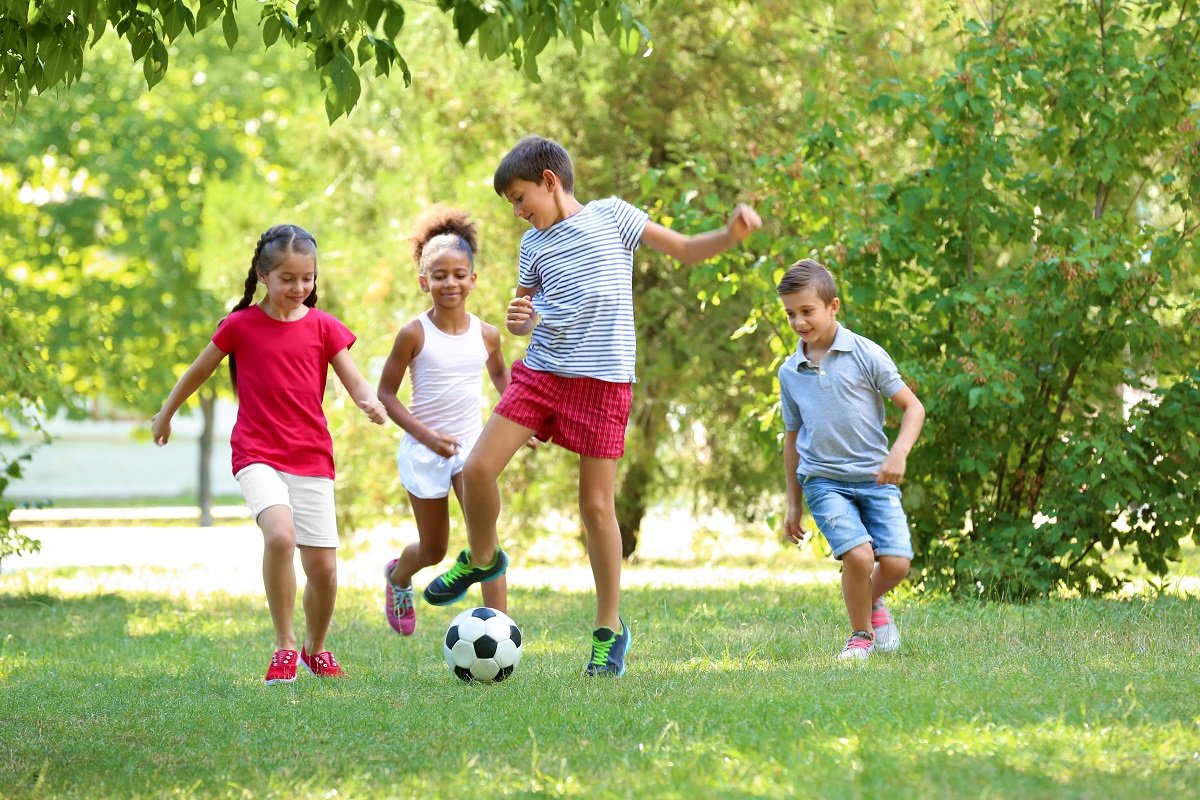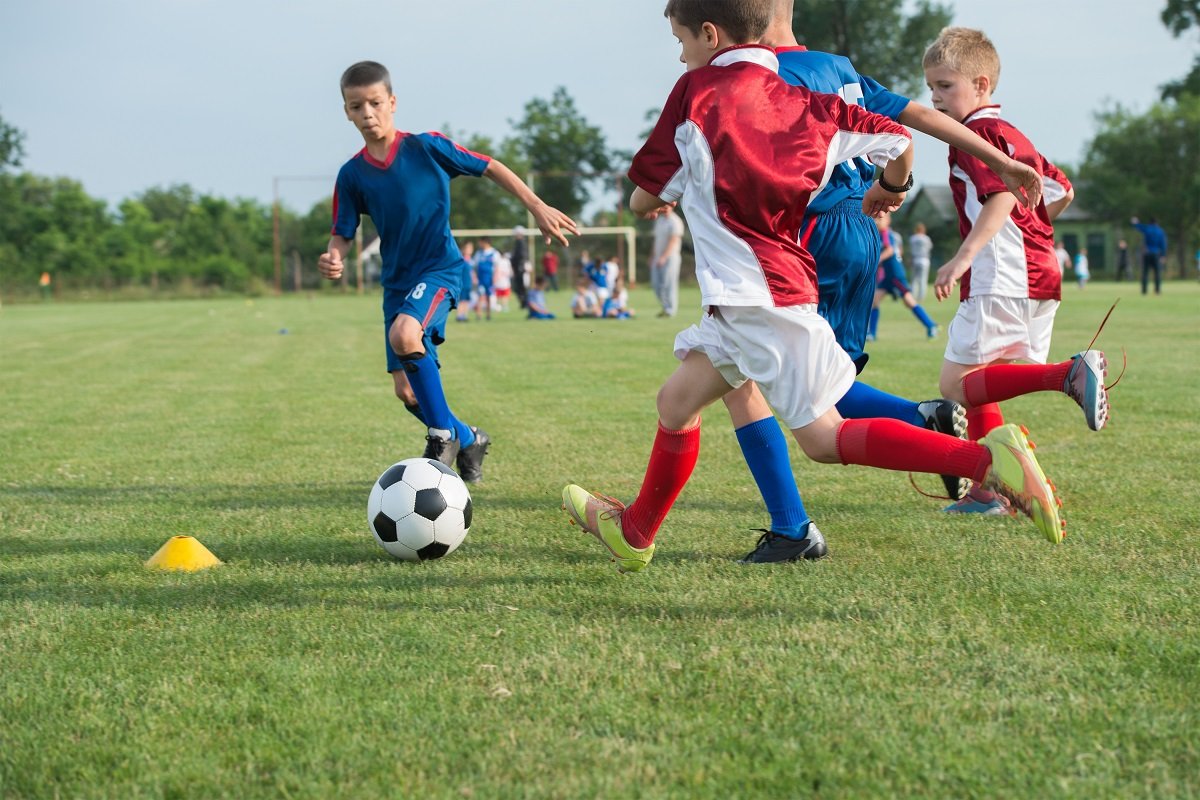
Is your child football-mad? Do you have children whose dream is to reach the game's highest levels? You are probably wanting to do everything you can to support them. In this guide, we provide tips and advice for how to help kids improve their football skills and ways you can support your child to enjoy the game. Parents and coaches play a key role for children at all levels of the game, so read on and discover how you can be there for them.
Football skills for kids
Football skills aren’t all about flashy tricks; it's important for children to learn the basic football skills that will allow them to lay a solid foundation. To help kids flourish in their young football careers, it's important to focus on developing a well-rounded skill set that encompasses both the technical and physical aspects of the game. Here are some key skills that kids should learn:
- Dribbling
- Passing
- Shooting
- Ball Control
- Heading (It should be noted that the FA stipulates heading should not be introduced in training sessions for under 11s and only sparingly until they are over 18).
- Tackling and defending
- Positioning
- Teamwork
- Spatial Awareness
- Fitness and agility
- Communication
- Set Pieces (attacking and defending)
- Goalkeeping
READ ALSO: What is grassroots football?
How to support your child and help them improve

There are a wide variety of ways to support your child and help them improve at football, and not all of them involve training – though that’s obviously important! Discover how to get better at football as a kid and how you, as a parent or coach, can help them.
Be patient with them
The question of how to improve in football has many answers, but one of the key components for children is having the freedom to develop at their own pace. This is why patient parents and coaches are so crucial.
You might see innate talent within your child and be desperate for them to unlock their potential. But be careful not to be overbearing and become impatient with them when they don’t quite make the advancements as quickly as you had hoped. By all means, get hands-on with the child, offer to take them into the garden or to the park for extra training, but be patient in allowing them to nail those skills.
Be open and honest
Honesty is often the best policy, and this is the attitude to take with a child working their way through the youth system, according to Lynn from the parenting blog Mrs Mummy Penny. She shared this top tip with us for parents wanting to support their children:
“As a parent of an academy son for eight years, the biggest piece of advice I can say is to always be open and honest. Talk to them openly about successes and failures. Never be afraid to celebrate and congratulate them when they have performed to their best ability, but also talk about their developmental needs. They will become more accomplished and resilient with knockbacks, so prepare them for this to happen and be there to talk if and when they do.”
Repetition
To really hone those football skills for kids and help your child progress, repetition can be one of the greatest tools at your disposal. It’s like learning any new skill; the more times you do something, the better you become. Practice makes perfect, as they say.
From shooting and passing exercises to ball control practice, whatever football drills for kids you are focusing on, work lots of repetition into your sessions. Of course, remember to be patient and listen to your child’s feedback if they want a break, but factor in a number of reps to each session and make sure you pick up that same drill another day. Eventually, the technique will click, and the skills the child wants to learn will begin to develop.
Make it fun
When it comes to children’s football, at whatever level, once it stops being fun, the kids will fail to progress. Don’t allow their favourite sport to become a slog. As parents, one of the best things you can do to support them and help them flourish at football is to do everything you can to make it fun.
If you want to go for a kickabout with them, that’s a great idea, but don’t pressure them or make time spent on the pitch boring. Footballers, even at the senior level, perform their best when they are having fun and expressing themselves. So, allow your child to do that. Work in a crossbar challenge, invite their mates for a five aside, and encourage those stepovers. If your child looks forward to playing football, there’s a better chance they will improve.
Encourage them
A little bit of encouragement goes a long way. If a child feels supported and encouraged by a parent, it can significantly impact how hard they are willing to work at something. On the other hand, if a child is being criticised when they fail, their self-esteem and confidence can take a big hit.
This must be avoided at all costs. No matter the level of the game or age group they play in, make sure to always encourage them, let them know that you are proud of them, and are there to support them. Confidence is a big part of football, so make sure your child brings that confidence onto the pitch.
Lucy Clarke, a mum of three and blogger at Real Parent, spoke to us about her advice based on her experience as a football mum, suggesting that parents should be their child’s “biggest fan, not their toughest coach.” She explains:
“In my opinion, a parent’s job isn't to critique their child’s every move or strategize their gameplay (that's what their coach is for), but rather to provide a safe, encouraging space for them to grow and learn.
“They're going to make mistakes. They might miss a goal, fumble a pass, or trip over their own shoelaces. And that's okay! The key is to encourage them to shake it off, learn from it, and try again.
“So, keep your pep talks positive and your hugs ready. Celebrate their victories, big and small, and most importantly, remind them that it's not about winning or losing but about having fun and doing their best.
At the end of the day, they're not just playing to score goals; they're playing to build character, resilience, and a love for the game. So, keep the energy high, the pressure low, and let their love for football do the rest.”
Invest in extra football training for kids
If your child is interested in taking their football to the next level; you can consider investing in extra football training for kids outside of their regular club or school sessions. Your local town or city will likely provide some kid's football sessions on weekdays after school or on weekends, which could be useful in getting in that extra practice that your child desires.
But remember, it should be something the child wants to do. If they are already playing football at school and on weekends, they might not be up for any extra training. However, if they are in the garden or park at every opportunity, they might jump at the chance for another chance to play during the week.
READ ALSO: When is the grassroots football season in the UK?
What to do when your child has lost their confidence

If your son or daughter has lost their confidence in football, it can seriously impact their enjoyment of the game and their desire to get out on the pitch. Loss of confidence can happen for many reasons, from injuries and lack of form to an overcritical parent or coach.
If you have noticed a lack of confidence in your child, do whatever you can to make football enjoyable for them again. This might involve taking a break for a while and just enjoying watching their favourite team play on TV for a bit. You could offer to join them for a kickabout in the garden or arrange for a game with their friends in the park.
When you see them engaging with football again and wanting to play, be encouraging and patient and try to build their confidence. Don’t put too much pressure on them; this can have the opposite effect. It will happen in their own time, and all you can do is be there to help them along if and when they want it.
READ ALSO: The 10 best football documentaries
Tips for young footballers

As a way of summarising some of the above and offering advice for parents to take away and support their children, take a look below at some top tips for young footballers:
- Work on the basics and master fundamental skills like dribbling, passing, shooting, and ball control.
- Practice regularly, including outside of team training sessions.
- Build up fitness and strength through regular exercise and a balanced diet.
- Learn the game inside and out, including rules, strategies and tactics.
- Join a team and play against varying opponents to broaden skills and understanding of the game.
- Set goals to strive towards and stay motivated for long-term development.
- Be open to feedback and advice, as this can help a player improve.
- Learn to play as a team and rely on other players, as you can only go so far as an individual.
- Study favourite players to learn from their technique and playing style.
- Be patient, as improvements don’t always come overnight.
- Play in different positions as this can improve versatility, expand skills, and increase understanding of the game.
- Don’t forget to have fun, as long-term success won’t happen if the player isn’t enjoying it.
READ ALSO: The 50 best football quotes
Football training equipment for kids
A great way to support your child and help them improve their football skills is by ensuring they have access to football training equipment for kids. This could involve you donating some kit to the local kid’s club or investing in some equipment for your child to use at home.
For example, having different-sized footballs can be helpful for younger children, as can having football goals at home – you can put one up in the garden or get something lightweight to take to the park.
If your child wants to practice their set pieces, you can buy a football mannequin, helping them to perfect their crosses and free kicks. Or how about a football rebounder? This is a great piece of kit that can be used to practice passing and shooting, bouncing the ball back to you each time.
Whatever you need, we at Diamond Football are the experts when it comes to football accessories and training equipment. We supply grassroots clubs nationwide and every single Premier League team. So, you know your kid is getting the best football products when you shop with us.
For more tips, guides, and advice, visit our blog.





